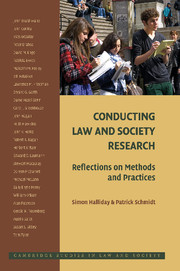Book contents
- Frontmatter
- Contents
- List of Contributors
- Acknowledgments
- 1 Introduction: Beyond Methods – Law and Society in Action
- 2 Stewart Macaulay and “Non-Contractual Relations in Business”
- 3 Robert Kagan and Regulatory Justice
- 4 Malcolm Feeley and The Process Is the Punishment
- 5 Lawrence Friedman and The Roots of Justice
- 6 John Heinz and Edward Laumann and Chicago Lawyers
- 7 Alan Paterson and The Law Lords
- 8 David Engel and “The Oven Bird's Song”
- 9 Keith Hawkins and Environment and Enforcement
- 10 Carol Greenhouse and Praying for Justice
- 11 John Conley and William O'Barr and Rules versus Relationships
- 12 Sally Engle Merry and Getting Justice and Getting Even
- 13 Tom Tyler and Why People Obey the Law
- 14 Doreen McBarnet and “Whiter than White Collar Crime”
- 15 Gerald Rosenberg and The Hollow Hope
- 16 Michael McCann and Rights at Work
- 17 Austin Sarat and William Felstiner and Divorce Lawyers and Their Clients
- 18 Yves Dezalay and Bryant Garth and Dealing in Virtue
- 19 Patricia Ewick and Susan Silbey and The Common Place of Law
- 20 Hazel Genn and Paths to Justice
- 21 John Braithwaite and Peter Drahos and Global Business Regulation
- 22 John Hagan and Justice in the Balkans
- 23 Conclusion: “Research Is a Messy Business” – An Archeology of the Craft of Sociolegal Research
- Index
- Cambridge Studies in Social and Cultural Anthropology
19 - Patricia Ewick and Susan Silbey and The Common Place of Law
Published online by Cambridge University Press: 09 February 2010
- Frontmatter
- Contents
- List of Contributors
- Acknowledgments
- 1 Introduction: Beyond Methods – Law and Society in Action
- 2 Stewart Macaulay and “Non-Contractual Relations in Business”
- 3 Robert Kagan and Regulatory Justice
- 4 Malcolm Feeley and The Process Is the Punishment
- 5 Lawrence Friedman and The Roots of Justice
- 6 John Heinz and Edward Laumann and Chicago Lawyers
- 7 Alan Paterson and The Law Lords
- 8 David Engel and “The Oven Bird's Song”
- 9 Keith Hawkins and Environment and Enforcement
- 10 Carol Greenhouse and Praying for Justice
- 11 John Conley and William O'Barr and Rules versus Relationships
- 12 Sally Engle Merry and Getting Justice and Getting Even
- 13 Tom Tyler and Why People Obey the Law
- 14 Doreen McBarnet and “Whiter than White Collar Crime”
- 15 Gerald Rosenberg and The Hollow Hope
- 16 Michael McCann and Rights at Work
- 17 Austin Sarat and William Felstiner and Divorce Lawyers and Their Clients
- 18 Yves Dezalay and Bryant Garth and Dealing in Virtue
- 19 Patricia Ewick and Susan Silbey and The Common Place of Law
- 20 Hazel Genn and Paths to Justice
- 21 John Braithwaite and Peter Drahos and Global Business Regulation
- 22 John Hagan and Justice in the Balkans
- 23 Conclusion: “Research Is a Messy Business” – An Archeology of the Craft of Sociolegal Research
- Index
- Cambridge Studies in Social and Cultural Anthropology
Summary
It may be Panglossian to say that everything works out for the best, but you could forgive Patricia Ewick and Susan Silbey for taking that view. The well-regarded book, The Common Place of Law, did not begin as their project or even the kind of project they might have crafted. Living in Massachusetts – and with families at home – left on their own, they would not have designed a project involving extensive travel to New Jersey. Substantively the project pushed them in new directions. But the invitation to have a hand in this project, and then the necessity of seeing it through, put Ewick and Silbey at the center of currents in the field, a place to make a contribution. Even the setting – the racially diverse, understudied mid-Atlantic state – turned out to be fortuitous.
Their reflections on The Common Place of Law suggest comparisons with any number of studies, from the deep ethnographic approaches of David Engel, Carol Greenhouse, and Sally Merry (Chapter 8, 10, and 12, respectively) to the survey methods of Tom Tyler and Hazel Genn (Chapters 13 and 20, respectively). What level of understanding can we draw from each method? What are the limits of each? What questions remain unanswered today, and what strategies will be necessary to answer them?
Collaborations can be an enjoyable, as well as a productive, way to approach scholarship, as made clear in many other chapters of this book. A common approach to collaboration, especially in an interdisciplinary field such as Law and Society, is to find your complement, someone who possesses a disciplinary or legal speciality that you need.
- Type
- Chapter
- Information
- Conducting Law and Society ResearchReflections on Methods and Practices, pp. 214 - 226Publisher: Cambridge University PressPrint publication year: 2009
- 2
- Cited by



